

Why Labor Organizing Should be a Civil Right: Rebuilding a Middle-Class Democracy by Enhancing Worker Voice, by Moshe Z. Marvit and Richard D. Kahlenberg, was released last year to critical and academic acclaim but not nearly enough attention. The book, whose authors are both fellows at the progressive think tank the Century Foundation, lays out a simple, brilliant idea: to amend the Civil Rights Act so that it prohibits discriminating against workers for attempting to organize a union.
We recently had a chance to pick the authors’ brains about the inspiration for the book, how the legislation would work and why this is an idea whose time has come.
Feldner-Shaw: For those who haven’t heard about it, can you briefly describe the premise or thesis of the book?
Marvit and Kahlenberg: As the title suggests, the book Why Labor Organizing Should be a Civil Right makes the argument that labor activities are a civil right and should be treated as such by our laws.
» Read more about: Should Labor Organizing Be a Civil Right? »
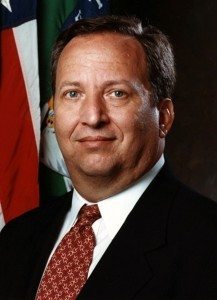

 In his recent defense of Larry Summers President Obama appeared to be badly confused about the state of the economy. This apparently leads him to believe that the country should be grateful to Larry Summers for his successes, as opposed to furious at him for his failures.
In his recent defense of Larry Summers President Obama appeared to be badly confused about the state of the economy. This apparently leads him to believe that the country should be grateful to Larry Summers for his successes, as opposed to furious at him for his failures.
Obama’s story is that the economy was in a free fall when he took office and the program that was in large part designed by Summers helped turn it around. While it is true that the economy was in free fall, there was no reason to expect that to continue regardless of what policies were pursued. Note that in every single wealthy country the sharp drop in output at the end of 2008 and the beginning of 2009 was stopped and reversed by the end of the year. Other countries were not able to rely on the genius of Larry Summers in setting their policies.


Not only does Walmart set the wholesale market price for many of the products and food commodities sold in its stores, it also apparently commands the unswerving political loyalty of some of the nonprofit groups that the retail giant underwrites. The Nation’s Lee Fang writes about how a trio of interns ran afoul of OCA Asian Pacific American Advocates (formerly known as the Organization of Chinese Americans), a prominent Asian American civil rights group, for displaying disrespect to Walmart — a large OCA funder. The story played out in Las Vegas last month during OCA’s annual convention, when one intern was rebuked by OCA staff for criticizing Walmart’s drive to open a grocery market in Los Angeles’ historic Chinatown. She and two colleagues were later booted out of the convention when a private video they’d made of flipping off Walmart made its way onto a public Facebook page.
» Read more about: Walmart Casts a Shadow on Civil Rights Group’s Convention »
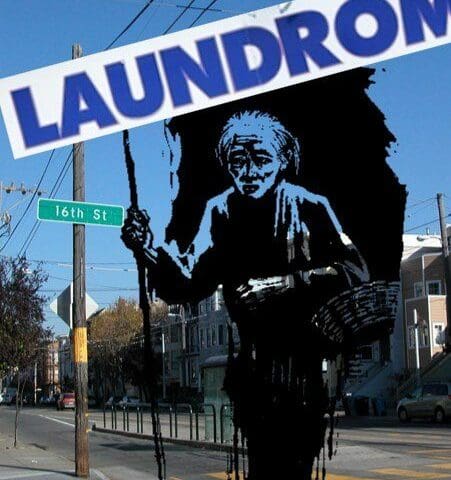

(The New York Times’ Thomas Friedman fancies himself a prophet who can foresee the future. Just look at his recent column on the “Sharing Economy” to see what the future has in store for us. Not good enough? I’ve studied Friedman’s ways and also learned to see the future. In fact, I’ve gotten so good at it that I’ve already written his next column.)
The Washed-Out Economy
Bill Richman and Teddy Wealthman were San Francisco roommates with a problem.
“We worked all the time at our well-paying Silicon Valley jobs,” Bill recently told me, “and didn’t have time to do our laundry.”
 So Bill and Teddy got an idea. While walking down 16th Street in San Francisco’s Mission District, on their way to get a $6-dollar cup of single-origin,
So Bill and Teddy got an idea. While walking down 16th Street in San Francisco’s Mission District, on their way to get a $6-dollar cup of single-origin,
» Read more about: Through Thomas Friedman’s Looking Glass »


 On [July 30], President Obama gave a great speech on why good jobs are the foundation for his middle-out economic strategy… from a huge Amazon warehouse where the workers do not have good jobs. I’m still stuck on the setting.
On [July 30], President Obama gave a great speech on why good jobs are the foundation for his middle-out economic strategy… from a huge Amazon warehouse where the workers do not have good jobs. I’m still stuck on the setting.
There is so much in President Obama’s speech that I’ve been wanting him to say. While the press focused on his announcement of a proposal on corporate taxes, the speech was almost entirely about jobs. After Obama described “what it means to be middle-class in America” as “A good job. A good education. A home to call your own. Affordable health care… A secure retirement,” he pointed out, “It’s hard to get the other stuff if you don’t have a good job.”
He told the Amazon warehouse workers, “we should be doing everything we can as a country to create more good jobs that pay good wages.”
But as The New York Times reported,


In the Appalachian foothills of Georgia, about an hour north of Atlanta, the riverfront city of Rome serves as a regional hub for health care. Near Rome’s tree-lined historic downtown, there are two well-equipped acute care hospitals with a total of more than 530 beds. Two years ago, the Medical College of Georgia opened a satellite campus in the city.
But in Rome, 27 percent of adults under 65 are uninsured, a rate that holds true across the state. Last year, the city’s two hospitals report spending more than $80 million delivering uncompensated care, often in the emergency room, where costs run high. Taxpayers and those with health insurance will end up paying for that care through government subsidies and higher premiums, industry experts say.
Rome’s dilemma is exactly the situation that the Patient Protection and Affordable Care Act, also known as “Obamacare,” was designed to fix — but that fix isn’t coming to Georgia.
» Read more about: Dixie Governors Say No to Expanding Medicaid »


 It’s August, and Americans by the millions are cramming themselves into coach-class seats as they embark on their summer vacations. Those able to learn from adversity might ponder this: Airline seating may be the best concrete expression of what’s happened to the economy in recent decades.
It’s August, and Americans by the millions are cramming themselves into coach-class seats as they embark on their summer vacations. Those able to learn from adversity might ponder this: Airline seating may be the best concrete expression of what’s happened to the economy in recent decades.
Airlines are sparing no expense these days to enlarge, upgrade and increase the price of their first-class and business-class seating. As the space and dollars devoted to the front of the planes increase, something else has to be diminished, and, as multitudes of travelers can attest, it’s the experience of flying coach. The joys of air travel — once common to all who flew — have been redistributed upward and are now reserved for the well-heeled few.
The new business-class seats that Lufthansa is installing convert to quasi-beds that are six-feet six-inches long and two feet wide, the New York Times’ Jad Mouawad reports.
» Read more about: Economic Inequality: The Sky’s Not the Limit »
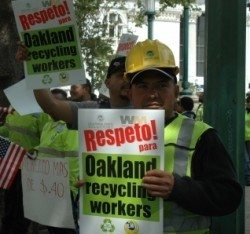
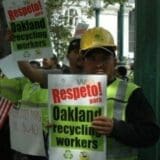
 Over 200 Oakland recycling workers staged a powerful show of unity and action by striking on Tuesday, July 30. Employees from the city’s two recycling contractors – Waste Management and California Waste Solutions (CWS) – walked off their jobs midway through the morning shift.
Over 200 Oakland recycling workers staged a powerful show of unity and action by striking on Tuesday, July 30. Employees from the city’s two recycling contractors – Waste Management and California Waste Solutions (CWS) – walked off their jobs midway through the morning shift.
Then, instead of picketing in remote industrial areas where the recycling plants are located, workers formed caravans that converged downtown at Oakland’s City Hall. The result was a full day of political action and solidarity that included marches, “human billboards” along Broadway and 14th Street, visits with local and state elected officials, and a spirited rally. The day ended where rally participants – including many community allies – filled the upper seats of the City Council chambers and addressed the City Council that evening.
Recycling worker Emanuel San Gabriel is one of CWS workers who left his dusty and noisy workplace behind to join the protest.
» Read more about: Waste Happens — So Do Accidents and Death »
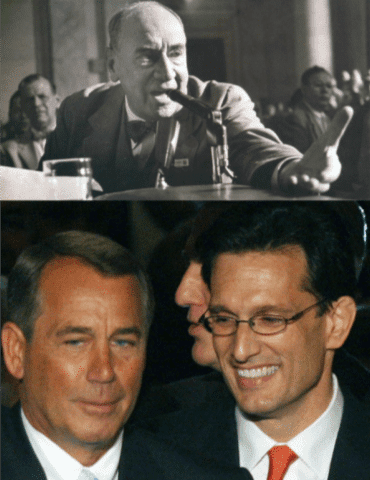

One of the most famous lines not spoken by the man it’s been attributed to is “Have You No Shame?” During the infamous Communist-witch-hunt Hearings of Wisconsin Republican Senator Joseph McCarthy in 1954, attorney Joseph Welch supposedly fired these words at McCarthy. What he actually said, however, is “Have You No Sense of Decency?”
Nevertheless, the first wording, mythical as it is, seems the more appropriate one to ask present-day Republicans, especially in the House of Representatives.
The majority of Americans are not always correct. But their consistently low regard for the present Congress, especially the Republican behavior within it, is dead-on. In a late July 2013 NBC/WSJ poll, only 12 percent approved of the job Congress was doing, while 83 percent disapproved. Another question (and the percentage response indicated afterward) was “Do you think Republicans in Congress are too inflexible in dealing with President Obama (56 percent),


An interview with John Densmore is less a linear dialogue and more a jazz improvisation, with unexpected twists and turns and no clear beginning or end. Which is not to say that the Doors’ drummer is without a steady beat — this is a man determined to drive home his message about the corrosive effects of greed. Densmore’s convictions led him to sue his former bandmates, Ray Manzarek and Robby Krieger, for trying to tour under the name “The Doors of the 21st Century” and using the band’s logo.
Densmore prevailed, but not without a bruising battle that created a bitter divide between the artists who once teamed with Jim Morrison on one of the greatest rock and roll bands in history. The story of that clash is the subject of Densmore’s latest book, The Doors Unhinged: Jim Morrison’s Legacy Goes to Trial.
Frying Pan News caught up with Densmore recently and riffed with him about what he calls “The Greed Gene,” Morrison’s views on money and his reconciliation with Manzarek before the keyboardist’s death earlier this year.
» Read more about: The Doors’ John Densmore Beats the Drum Against Greed »